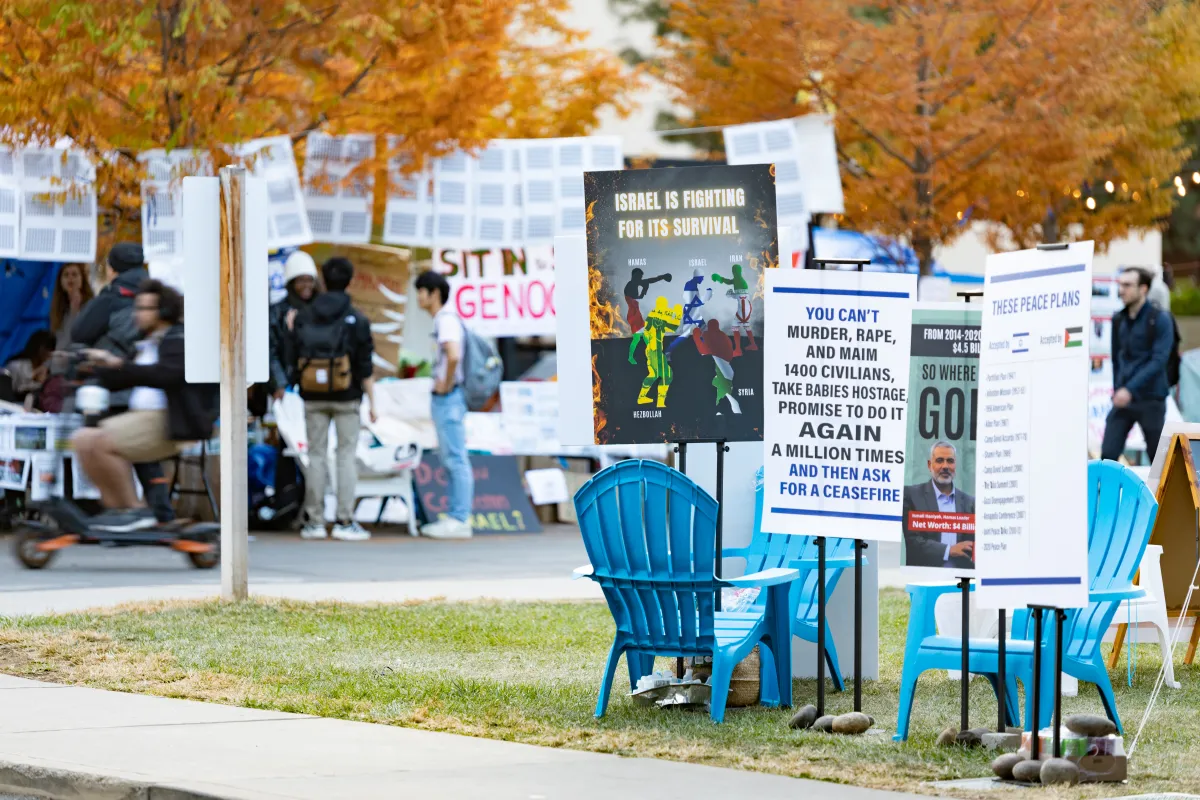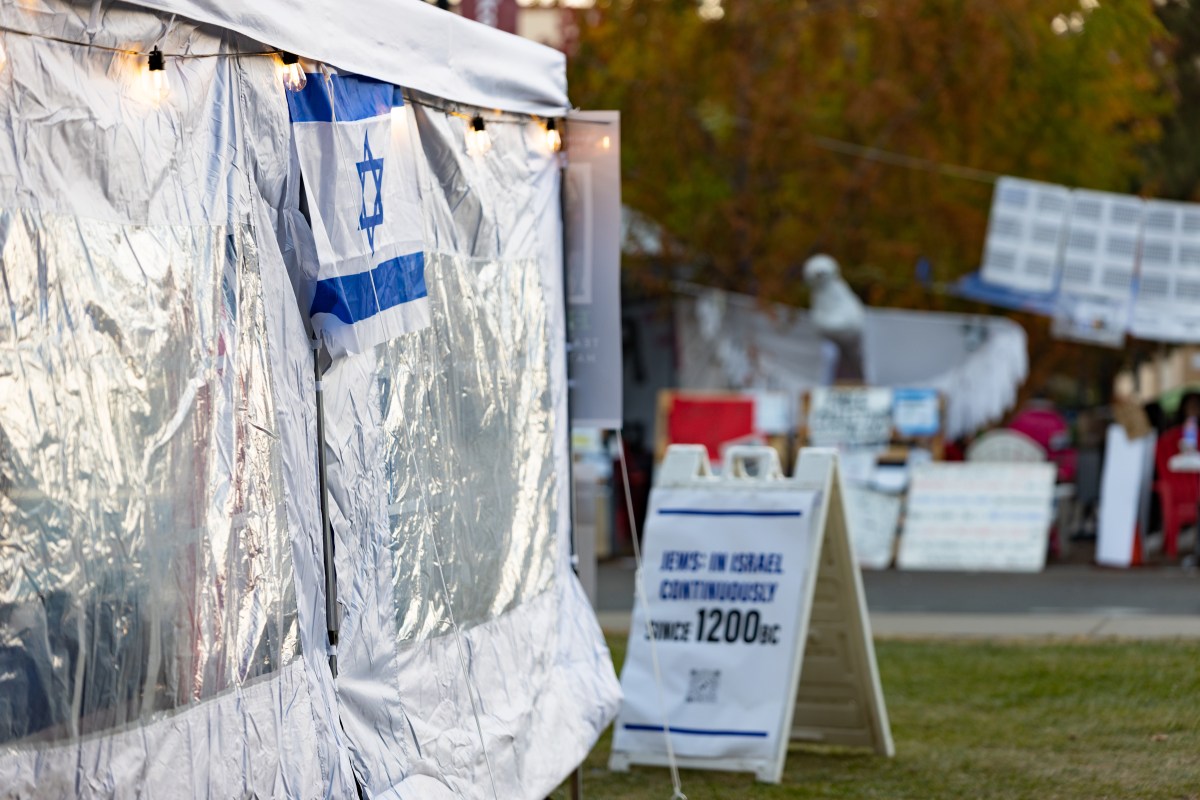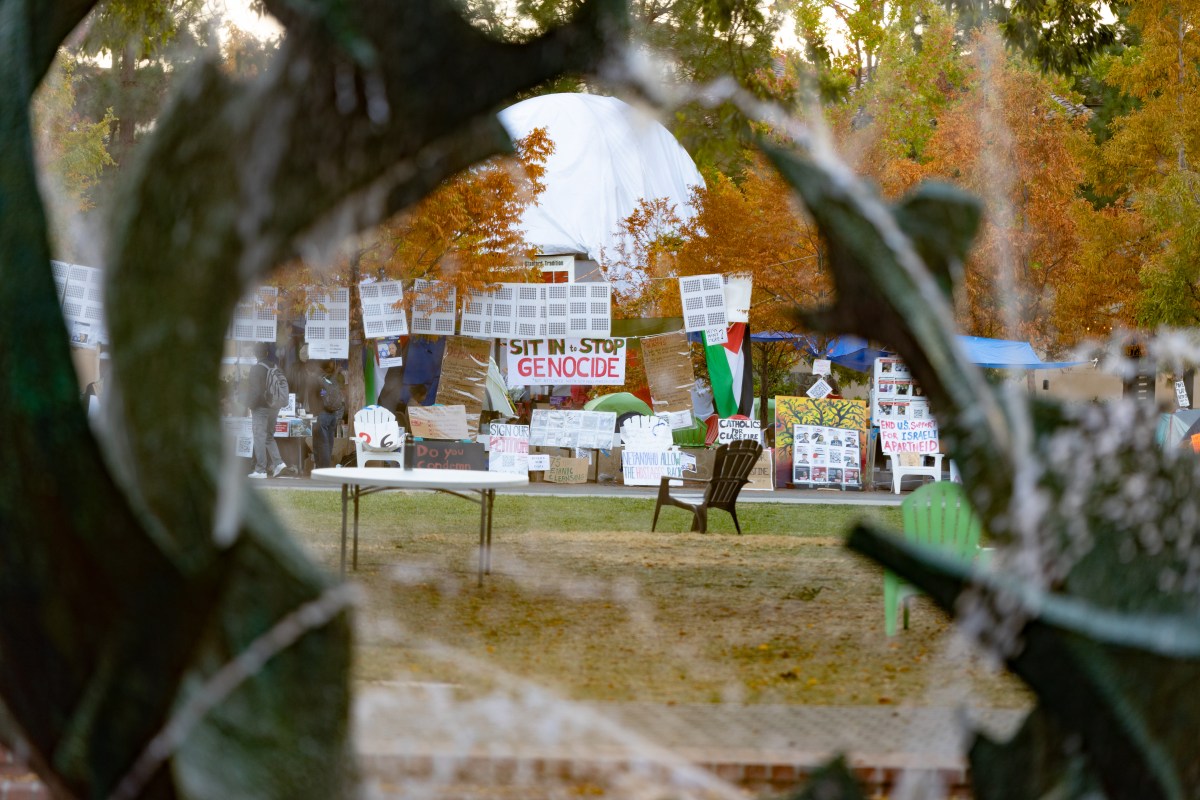Students and Jewish and Israeli community members began manning a tent surrounded by pro-Israel posters and Israeli flags in White Plaza on Monday.
The initiative attempts to create peaceful conversation on the Israel-Gaza war amid an increasingly polarized campus climate, the tent’s organizers told The Daily. The tent is not organized by any specific student group; rather, it is formed by students from across different groups and identities who wish to speak on the conflict from their own perspectives.
The tent is set up about 20 feet across from the “Sit-In to Stop Genocide,” which has now continued for 26 days as participants demand that the Stanford administration condemn Israeli war crimes, commit to the Boycott, Divest and Sanction movement against Israel and provide resources to Palestinian and diaspora students.
Students involved with the sit-in said they feel the tent is in direct opposition to the efforts. The tent’s organizers told The Daily they are not trying to oppose the sit-in, but rather are trying to create another space for conversation on the ongoing Israel-Gaza war.

Hamas led a surprise assault against Israel on Oct. 7 that killed more than 1,200 people and took over 240 hostages, according to the Israeli Foreign Ministry. The attack is now regarded as the most brutal in Israeli history.
According to Gaza’s Health Ministry, 11,100 Palestinians have been killed in retaliation by Israeli airstrikes and a ground invasion, with most of the dead being women and children. UNICEF expressed confidence in the death toll, which is based on sources in Hamas-controlled Gaza. The Health Ministry said Friday that it could no longer provide updated death tolls due to the intensity of fighting and damaged infrastructure.
Unlike the sit-in, the tent has no overnight component. Organizers said they plan on setting it up and taking it down every day this week. They plan to evaluate the tent’s future after Thanksgiving break.
Isaac Deutsch ’25, who helped organize the space, said students discussed setting up a tent for the past week and half.
Echoing Deutsch, Tia Geri ’25, another organizer, said that an initiative to promote discourse had been in the works for a long time: “What brought it from just a conversation to reality was the increasing lack of opportunities to bring groups together for genuine conversation.”
One sign around the tent read “Antisemitism never goes out of fashion,” with captions comparing Hamas to the Nazi Party. Another read “Rape is not resistance.”
Deutsch said he hopes the tent becomes a prominent place where students can “come and talk and hear other perspectives that have not been circulating around campus as much lately.”
“We want to provide context, history and a space to voice and share opinions,” Deutsch said. “We wanted to address the misinformation getting thrown around — information that is lacking context and the background.”
Geri said their tent’s presence is important in the face of rising incidents of antisemitism at Stanford and on other college campuses. She believes the establishment of the tent will help increase the diversity of views expressed on campus.

Deutsch said the tent is not meant to oppose the sit-in. Rather, they chose White Plaza because “this was the place that we felt was most trafficked,” he said.
Deutsch, who was present at the tent for most of the day, said they’ve “had some really lovely conversations — some with people who are actually involved in the sit-in.”
Aviv Simchony, a third-year Ph.D. student in physics from Israel, was at the tent and talked to passersby throughout the day. He said he did not want to be politically involved, but feels it has been increasingly difficult to be an Israeli on campus. He said he felt his voice was not being heard.
“What I want is for people to understand both perspectives in the conflict,” he said. “I can’t speak for the Palestinian side. The people at the sit-in do that to some extent, but, as someone from Israel, I am able to give a point of view that might be missing.”
Simchony said he had previously attended a teach-in about Palestine a couple years ago and believes that it is valuable for people to talk and listen to each other. He believes the tent is a great way for the community to come together and support each other.
“I feel a lot of sympathy towards the people in Gaza and the situation there right now,” Simchony said. “I just want to encourage people to be sensitive, do the research and hear about what’s going on and why things are the way they are. We’re all hurting right now.”
A student who has been active with the sit-in but requested anonymity due to fear of retaliation said students and community members should conversation with both the sit-in or the tent “in good faith.”
“It’s important for people of opposing sides to be able to exist at the same place and on the same campus,” the student said. “But it’s also important that we recognize what each side is fighting for. I can only speak for us. Our fight is a fight for people and for justice. It’s for liberation and the ending of genocide.”
Draper Dayton ’25, who is Jewish and heavily involved in the sit-in, said he sees the tent as a form of opposition against the sit-in’s efforts.
“There’s a reason they chose a tent and there’s a reason they’ve set it up directly across from us,” he said.
Dayton said the optics of the two camps directly opposite one another is emblematic of the divisive culture on campus today.
“I find all the rhetoric that is in opposition to what we’re standing for at the sit-in inherently reactionary. There is no cohesive vision of progress or of peace,” Dayton said. “It is simply a defense of the status quo — a status quo, which through a cursory examination of history, we know is murderous, genocidal and exists as an apartheid state.”
Amnesty International characterized Israel’s policies on Palestinians as consistent with that of an apartheid state. Amnesty International also condemned Hamas’ attack on Oct. 7.

Draper also called into question the purpose of the tent.
“When people say they want their perspectives to be heard, of course, I’m respectful of that. But, I’m confused on what their perspective is,” he said. “Is it that the ongoing genocide is at all permissible or something that we should be defending?”
Katie Eder ’24, a Jewish student who has also been involved in the sit-in, agreed with Draper and said “it’s not clear what they’re organizing for, and it’s not clear what they stand for.”
Eder said she grew up in a Zionist household and feels obligated to speak up for Palestinians because “so much of the terror that is inflicted by the State of Israel is done in the name of the Jewish people.”
“A lot of Jewish institutions on Stanford’s campus and across the country are equating criticizing anti-Zionism as antisemitism and I think that is very dangerous,” Eder said.
“It is really, really important that people are able to critique Israel without being called antisemitic,” Eder said.
Sean Yoon ’26, who walked by the tent and sit-in, said that while he is not the most knowledgeable on the conflict, he finds it important that both groups can set up spaces for discourses close to each other.
“It’s good that both sides are represented and that people who are interested in the conversation are able to engage in it,” he said.
